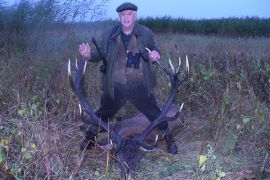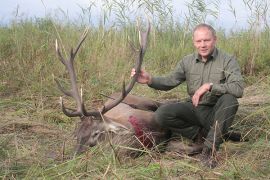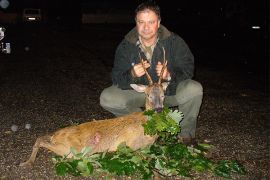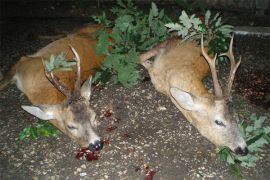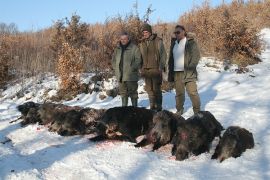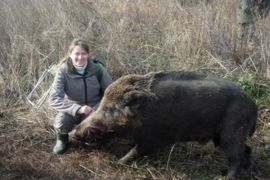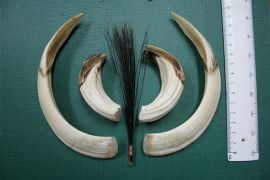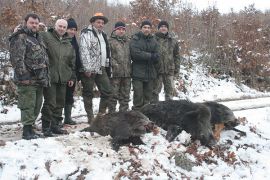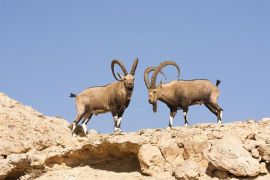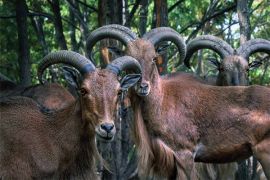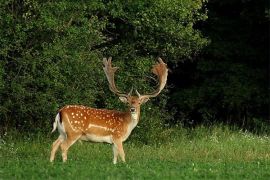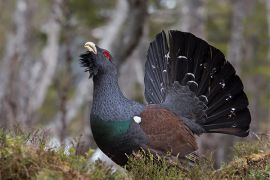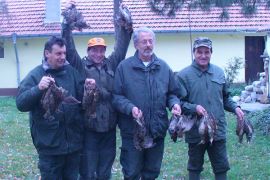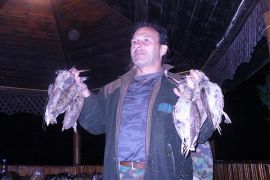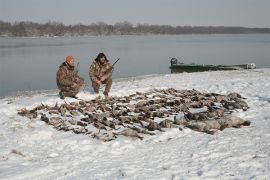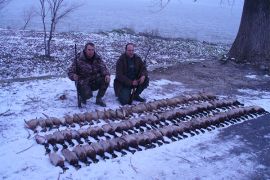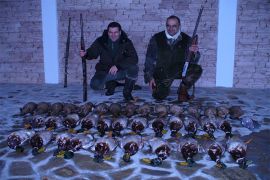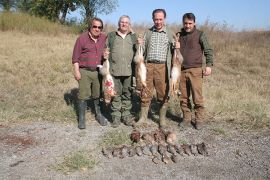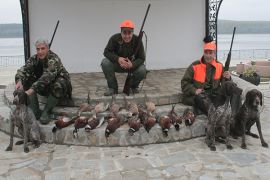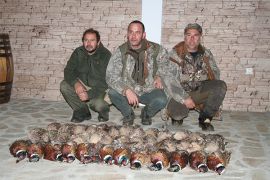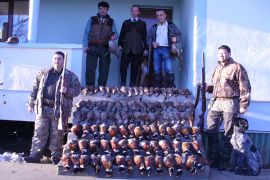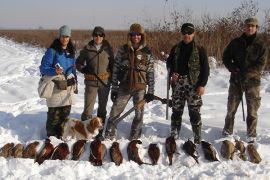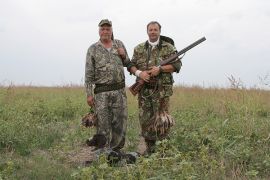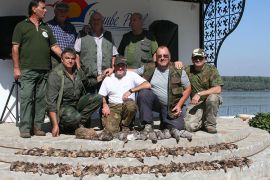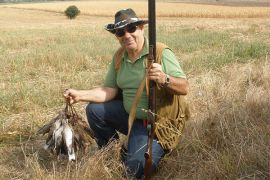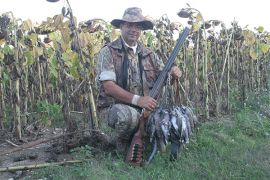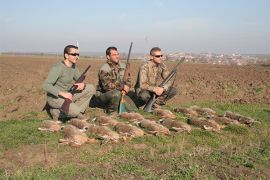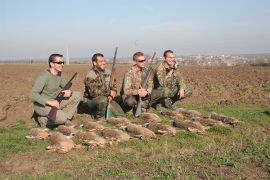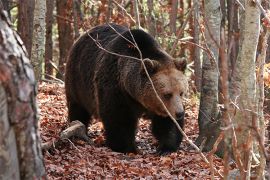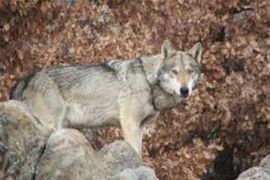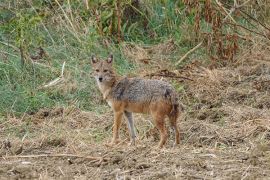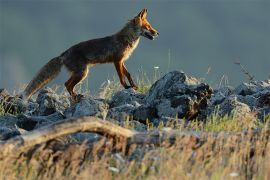Hunting trips in Europe - Hunting area Побит камък 2554
Big game hunting in Europe - Hunting area Побит камък 2554
- Hunting services - Big game hunting in Europe
Small game hunting in Europe - Hunting area Побит камък 2554
- Hunting services - Small game hunting in Europe
Hunting trips and packages in Europe - Hunting area Побит камък 2554
- Hunting services - Hunting trips and packages in Europe
Hunting lodges in Europe - Hunting area Побит камък 2554
- Hunting services - Hunting lodges in Europe
Hunting trophies in Europe - Hunting area Побит камък 2554
- Hunting services - Hunting trophies in Europe
Red deer hunting in Europe - Hunting area Побит камък 2554
- Hunting services - Red stag hunting in Europe
Fallow deer hunting in Europe - Hunting area Побит камък 2554
- Hunting services - Fallow buck hunting in Europe
Roe deer hunting in Europe - Hunting area Побит камък 2554
- Hunting services - Roe buck hunting in Europe
Wild boar hunting in Europe - Hunting area Побит камък 2554
- Hunting services - Wild boar hunting in Europe
Mouflon hunting in Europe - Hunting area Побит камък 2554
- Hunting services - Mouflon hunting in Europe
Chamois hunting in Europe - Hunting area Побит камък 2554
- Hunting services - Chamois hunting in Europe
Bear hunting in Europe - Hunting area Побит камък 2554
- Hunting services - Bear hunting in Europe
Bird hunting in Europe - Hunting area Побит камък 2554
- Hunting services - Bird hunting in Europe
Wood grouse hunting in Europe - Hunting area Побит камък 2554
- Hunting services - Wood grouse hunting in Europe
Wild duck hunting in Europe - Hunting area Побит камък 2554
- Hunting services - Wild duck hunting in Europe
Pheasant hunting in Europe - Hunting area Побит камък 2554
- Hunting services - Pheasant hunting in Europe
Woodcock hunting in Europe - Hunting area Побит камък 2554
- Hunting services - Woodcock hunting in Europe
Quail hunting in Europe - Hunting area Побит камък 2554
- Hunting services - Quail hunting in Europe
Turtle-dove hunting in Europe - Hunting area Побит камък 2554
- Hunting services - Turtle-dove hunting in Europe
Partridge hunting in Europe - Hunting area Побит камък 2554
- Hunting services - Partridge hunting in Europe
Find our discounted hunting trips in Europe
- Hunting trips in Bulgaria directly from outfitters
» Bulgaria Hunting Trips » Hunting in Europe » Hunting area Побит камък 2554
- BOOK YOUR HUNT IN BULGARIA
Bulgaria remains among top hunting destinations in Europe

Bulgaria continues to be among the top choice destinations for hunting tourism in Europe. Bulgaria is a country of traditions in the shooting of trophy animals and most of the foreign hunters arrive to this country for that purpose. If you want to get Gold Red Deer, Mouflon or Wild Boar – this country is your best choice. There is also a great choice of other game of great trophy quality: Fallow Deer, Roe Deer, Chamois.
Bulgaria is one of the countries with highest biodiversity in Europe. All big game species in Europe are represented in Bulgaria in an ideal habitat. 18 mammal species and 20 bird species are hunted here. No other European country has such a diverse game population. We have areas where the unique possibility to hunt 10- 12 different game species at the same time exists.
Location and Landscape

Bulgaria is located in the southeastern part of Europe, on the Balkan Peninsula. It has a total area of 111,000 square kilometers. It borders Romania to the north, Serbia and Macedonia to the west, Greece and Turkey to the south, and the Black Sea to the east. The climate has 4 seasons. The landscape is diverse - from planes through plateaus and hills to steep and high mountains. The country has a dense network of rivers, equally distributed all over the country as well as many lakes and reservoirs. It has a vast diversity of flora and fauna.

Climate

The climate is temperate continental. Only in the southern parts of the country and at the coast of the Black Sea a transition to a Mediterranean climate is felt.

Bulgaria Hunting Trips | Hunting area Побит камък 2554
- Лов Побит камък 2554
- ✓ Hunting in Bulgaria Побит камък 2554
- Caccia in Bulgaria Побит камък 2554
- Chasse en Bulgarie Побит камък 2554
- Jagd in Bulgarien Побит камък 2554
- Caza en Bulgaria Побит камък 2554
- Κυνήγι στη Βουλγαρία Побит камък 2554
- Bulgaristan'da Avcılık Побит камък 2554
- ✓ Big game hunting in Bulgaria Побит камък 2554
- Red deer hunting in Bulgaria Побит камък 2554
- Fallow deer hunting in Bulgaria Побит камък 2554
- Roe deer hunting in Bulgaria Побит камък 2554
- Wild boar hunting in Bulgaria Побит камък 2554
- Mouflon hunting in Bulgaria Побит камък 2554
- Barbary sheep hunting in Bulgaria Побит камък 2554
- Chamois hunting in Bulgaria Побит камък 2554
- Himalayan tahr hunting in Bulgaria Побит камък 2554
- Bezoar ibex hunting in Bulgaria Побит камък 2554
- Wood grouse hunting in Bulgaria Побит камък 2554
- ✓ Small game hunting in Bulgaria Побит камък 2554
- Pheasant hunting in Bulgaria Побит камък 2554
- Quail hunting in Bulgaria Побит камък 2554
- Turtle-dove hunting in Bulgaria Побит камък 2554
- Partridge hunting in Bulgaria Побит камък 2554
- Wood pigeon hunting in Bulgaria Побит камък 2554
- Woodcock hunting in Bulgaria Побит камък 2554
- European hare hunting in Bulgaria Побит камък 2554
- ✓ Waterfowl hunting in Bulgaria Побит камък 2554
- Wild duck hunting in Bulgaria Побит камък 2554
- Goose hunting in Bulgaria Побит камък 2554
- ✓ Predator hunting in Bulgaria Побит камък 2554
- Wolf hunting in Bulgaria Побит камък 2554
- Jackal hunting in Bulgaria Побит камък 2554
- Fox hunting in Bulgaria Побит камък 2554
Hunting trips in Europe
Hunting in Europe
- Hunting in Europe
- Побит камък 2554
Small game hunting in Europe
Woodcocks hunting in Europe
One of the most popular types of wing shooting in Bulgaria is woodcock hunting, and for good reason. These birds' migration route takes them directy through Bulgaria, making it one of the best woodcock hunting destinations in the world.
Woodcock hunts begin at around 9:00 AM, the best time being in daylight, with a pointing dog. The Setter and the Pointer have proved themselves invaluable helpers for this hunt. The woodcock is a secretive bird; most commonly encountered in forests, hence its name - woodcock. It likes to hide along the edge of the forest, in gullies, near small rivers, where the soil is soft and in short bushes (briar, blackberry and thorny bushes), but must be close to the forest. During rapid temperature drops, the woodcock can be found in pine forests, where the snow and rime can’t reach the ground.
There it spends the entire day feeding and resting, and manages to survive because the soil doesn’t freeze. Some of the best regions for hunting woodcocks can be found in Bulgaria. These regions maintain the vitally necessary for the bird temperature of 5 degrees Celsius. It’s a well-known fact that one of the biggest woodcock migration routes - via Pontica - passes through Bulgaria, making it one of the best hunting destinations for this bird in the world.
These birds stay for the longest time-period precisely in Bulgaria. Bulgarian hunters don’t have much interest in woodcocks, allowing mostly foreign hunters to indulge in this type of wingshooting in Bulgaria. The best habitats are near the Black sea, because the snow melts quickly thanks to the maritime climate. The hunting terrains are easily traversable because the soil is soft and lacks rocky areas. Some of the forests are sparse which allows for better visibility of the birds and more trophies.
The hunt for woodcocks is tremendously interesting because it is difficult, involves long treks and strong emotions. The best pointing dog for hunting these birds is the English setter. It has a firm stance, searches the places where the vegetation is thickest, has a good tempo and covers large areas. Unlike the Pointer it searches in a circular fashion and, most of the time, it tries to block the bird’s escape.
The Pointer has a good sense of smell, but searches further and in a straight line, which makes it possible for it to miss some of the birds. There are exceptions; some Pointers are very good in hunting woodcocks. Lately, we have begun to see the German shorthaired pointer in the forest, but the problem is that they track and give chase to furred game.
The best terrains for woodcock wingshooting in Bulgaria are short-stalked forests, clearings, and sparse beech, oak and coniferous forests as long as there are meadows frequented by livestock nearby. At night, woodcocks find their food in those meadows by burrowing.
Wood Pigeons hunting in Europe
In the beginning of the season for wood pigeon hunting doesn’t differ from turtledoves as both animals are stalked in the same feeding spots (sunflower fields and harvested agricultural fields).
Hunters have to be at the hunting grounds at 7:00 AM and can hunt there until 11:00 AM. From 11:00 AM to 16:00 PM the birds can be stalked by the watering spots (beside rivers, swamps, overflows etc.) and the places where they rest (damp, sunless forests beside sunflower fields, acacia forests, dried tree trunks or massive singular trees from which the wood pigeon has the possibility to keep watch for any threats). Hunters need to be under the cover of a tree or at the edge of the forest and shoot only birds in flight. The period for this type of wingshooting in Bulgaria starts the beginning of August and ends on the 30th of October.
Wood pigeon hunting with lures:
Wood pigeons can be hunted with lures beginning from the 30th of October until the end of February. The hunting grounds are rice fields, harvested corn and sunflower fields etc. The most important thing about this hunt is observation, based on it we can determine where exactly the birds feed.
Using camouflage netting a hideout is constructed near the edge of the field. 20 to 40 artificial birds and two devices with rotating mock wood pigeons imitating landing birds and luring flocks. Spreading some additional food, found in the field (sunflower seeds, corn etc.), between the lures is recommended because the birds have excellent vision. Additionally a lone, static, wood pigeon is placed on a high place overlooking the field to play the role of a lookout.
Shooting range is 15-30 m.; firing before the bird lands gives the best results. When there is more than one person involved, the hunters are allowed to fire only on command.
Retriever dogs can be used for this type of wingshooting in Bulgaria. The dog must be well disciplined and must be able to stay still inside the hideout because the birds are suspicious when they notice movement. The hunters must stay still while in the hideout as well.
Weapon: Semi-automatic rifles are the preferred choice, but side-by-side or over/under shotguns can also be used. Barrel length should be between 66 and 76 cm and the chokes can be: |, ||, |||. The most commonly used rounds are № 6 ½ and № 7 ½, generally though you can use rounds ranging from № 5 to № 8
Accessories: camouflage netting, 3D camouflages, appropriate clothes that seamlessly blend in with the terrain.
Wood Grouse hunting in Europe
The wood grouse is the biggest gallinaceous bird and is encountered in pine forests at over 1500 m above sea level.
It is also one of the most prestigious trophies among birds. Wood grouse hunting takes place early in the morning, before dawn. Observations need to be made beforehand to identify the so-called tokovishta (places where the wood grouse mates with 1 to 6 females).
Wood grouse hunting can only take place during its mating period, and having a guide who knows the area well is mandatory, because the trecks to the hunting grounds are made in complete darkness. Advancing towards the singing wood grouse happens on command from the guide.
Depending on the terrain, up to 3 paces are walked only during certain parts of the wood grouse’s song. It makes 3 sounds and the hunters can move only when it starts singing the third one - brosene. This is a sound that mimics the sound of sharpening a scythe. Before that the two others are popping (sounds like opening a bottle of champagne) and knocking. When making the third sound the wood grouse can’t hear anything, that’s why the hunters need to make their advance then.
If a hunter cannot synchronize their movement with the bird’s song, the guide must take their hand and make sure they move in unison with the melody. Shooting distance is about 30 m and the shot is taken on the command of the hunting guide. This is the only bird that can be shot when on the ground. The rounds are № 2/0 до № 4/0 when hunting with a smoothbore weapon.
When hunting with a rifled weapon, the shooting distance can be between 50 to 80 m, if the visibility allows it. When using a rifled weapon the wood grouse can be hunted in daylight, because the distances are significantly greater. Rifles and Flobert rifles can be used, as well as 223 and all small caliber shotguns. The wood grouse in Bulgaria is an exceptional trophy but it isn’t a bird that can be consumed. It is a trophy which can be stuffed and preserved.
The hunt itself is very interesting and emotional.
Wild ducks hunting in Europe
Wild duck hunting is one of the coldest and most exciting types of wing shooting in Bulgaria. There are three types of duck hunting. The first kind is at flight, early in the morning and at dusk. The second kind is with fake lures at the resting spots (reservoirs, dams, rivers and runoff water). The third kind is walked up hunting along river banks, canals and streams.
When hunting in the early hours of the morning, the hunters have to be at the hunting spots before dawn. The birds move from ther feeding spots towards the resting spots. Those are normally large dams and high-water rivers. Wearing warm clothes is recommended, but using camouflage coverings is a must, due to the fact that these birds have a sharp eyesight and a very acute sense of hearing. It is a good idea for hunters to use auditory decoys, so as to direct the birds towards themselves. You may use retriever dogs (Golden Retrievers, Labradors, Drahthaarts, Kurzhaarts and Setters). The dogs need to be very disciplined, compliant and to obey the command Stay in place!. Dogs with experience trace the shot birds by themselves and swiftly retrieve them for their guide.
During the hunts at dusk, it is advisable to lie in wait for the ducks at their feeding spots.
Those are: surface runoff areas (overland flow), harvested fields (rice fields), shallow streams, flooded corn fields (grooves filled with water). It is mandatory to use auditory decoys, so as to direct the birds towards the desired places. It is advisable to use retriever dogs, due to the fact that the hunt takes place in the darker hours of the day. For this kind of wing shooting in Bulgaria, using Drahthaars and Kurzhaars brings greater success. They are able to find the shot birds visually as well as by smell, while Labradors and Golden Retrievers tend to track the bird visually and are more suited for hunting at wide open water areas (reflective water surfaces).
Walked up hunting is the second method of hunting ducks. That is an emotion-filled outing involving long hikes, which is why the hunter must be in excellent health. This kind of hunt is most sucessful when the bigger dams in the area freeze over. Smaller canals and rivers do not allow the water to freeze even at temperatures below - 15 degrees. Birds are aware of that and they find favourable conditions to rest and eat. It is recommended to start this type of hunt at 6 am, and it can last until as late as 5 pm. It may then be combined with an evening hunt at dusk. Combined, the two types of hunt can bring wonderful results. During walked up hunts, it is good to use a guide who knows the places where the birds rest during the day. Once you near the resting spots, you need to move quietly and stay low. You need to use the surrounding vegetation as a cover while you approach the birds and use the element of surprise. It’s possible to lift between 20 and 50 birds into the air at one of these spots. When moving along a riverbank or canal, you need a disciplined dog that walks no more than 15 - 20 steps ahead of you. Once you near the resting spots, the dog must obey the command Heel! or Behind me! so as not to lift the resting game birds. In Bulgaria, the most widely established dog breeds are Drahthaar and Kurzhaar. Once the birds have been shot, the dogs must retrieve the birds from water as well as dry land under the command Retrieve!. The dog must be able to maneuvre through obstacles (water obstacles, fallen trees, ponds, etc.) - in other words, it needs to be hardy while retrieving.
The third kind of hunting is by lying in wait for the birds at their resting spots. Those are: large reservoirs (dams), surface runoffs. It is mandatory to use lures (decoys). It is advisable to put between 40 and 100 duck decoys into the water. It is good to have two or three pairs of spinning wing decoys (mojos). You may use mobile duck decoys with electric motors, so as to create the illusion that the birds are moving. The hunters need to have made a temporary hiding place at the river bank. It must blend in with the terrain so as not to arouse suspicion in the birds. A boat camouflaged with reed vegetation can be used for the same purpose. Hunting by boat allows the hunters to choose the hunting spots for themselves. When using decoys in such cases, they need to be mobile, with built-in chords and weights (so that they can be thrown directly from the boat).
Turtle-Doves hunting in Europe
The turtle-dove’s passage begins at 7:30 AM and ends at 11:00, at the places where it feeds (sunflower fields), that is why the hunters have to be at the hunting grounds by 7:00 AM. Due to the fact that birds of the dove species use the same air corridors when flying, it is advised that the hunting guides research the hunting spots a day or two in advance.
The spots where the cover will be set to stalk the birds are decided on the basis of the collected information. After 11:00 AM if we’re not satisfied with the results, we can stalk the birds by their watering places (by rivers, swamps, overflows etc.), on the condition that there are trees, dried tree trunks, electrical posts and wires.
The use of retriever dogs is common practice. The dog must be very disciplined and adept at carrying out commands.
It should obey the commands: stay, lay down, fetch. An experienced dog has the ability to track the moving birds before the hunter and upon shooting to bring back the bird quickly and energetically, well remembering the shot bird’s exact spot. It must sit down in front of the hunter and give back the animal.
During a group hunt (in groups of 4 - 8 hunters), it’s advisable they cover all corridors of the passing birds, forcing them to keep flying in the air and giving the hunters a chance to continue shooting. The turtle-dove flies at speeds of 70 to 90 km/h and must be anticipated properly.
Snipes hunting in Europe
Snipes are rarely the target of Bulgarian hunters, but there is quite the interest from foreign hunters.
This type of wing shooting in Bulgaria doesn’t require the hunters to get up early and can continue the entire day. Snipes are most commonly hunted in the so called overflows (fields that retain water, rice fields, spots where rivers have overflown and shallow lakes).
This is a bird that makes one of the longest migratory flights in the world. There is evidence that some specimens travel from Japan to Bulgaria. The hunt is very emotional and puts the hunter’s marksmanship skills to the test.
On liftoff snipes let out a cry which guides the hunter to the target. The problem is the bird makes sudden and sharp turns to either side and after the 30th meter straightens out its trajectory.
Missing the target is quite common. Out of the three types of snipes (small, common and large) the common snipe is allowed to be hunted in Bulgaria. Retriever dogs, which cope well with watery terrains, can be used.
The dogs must work very close to the hunter, at a distance no greater than 20 - 25 m. because the snipe lifts off at the 20th meter (the bird doesn’t allow the hunter to get close to it; the terrain doesn’t allow stealthy movement) and does so very quickly, making it quite difficult to hit.
English Setters have established themselves as the best dogs for this hunt. They have a good, firm stance and an exceptional sense of smell. Their fur protects them from the moisture and they can work all day.
Snipe hunting is allowed in the period from the beginning of August to the end of February. The best time for this type of wing shooting in Bulgaria is in December and January when most water basins freeze.
Quails hunting in Europe
Quail hunting in Bulgaria - one of the two types of wing shooting in Bulgaria that can take place as early as August. Quail hunting is carried out primarily in the early hours of the day. It’s recommended you be at the hunting grounds by 6:00 AM.
In the beginning of the season, it is best you hunt until 10:00 AM and from 16:00 to 19:00 in the afternoon because of the high temperatures which impede the dogs work. During that period, it’s advisable you choose hunting grounds that are at greater altitudes. Practice shows us that quails prefer higher mountainous regions when the temperatures start to rise. They are most commonly encountered in meadows where different sorts of millet grow, in flat fields of harvested grain crops or the so called stubble fields where weeds are dominant.
The use of dogs of English breed (Pointer, Setter, etc.) is recommended. Hunting quails in passages is the most intense and successful method, when groups of 1000 to 3000 birds are formed. The season for this kind of wing shooting in Bulgaria is from the 1st of September to the 1st of October. During this period, temperatures are lower and it’s possible to hunt throughout the course of the entire day. A single hunter can shoot more than 100 birds during this type of hunt.
If the dogs are well trained, it is possible to shoot around 15 - 30 quails in about 2 - 4 hours. Our advice is to only shoot when the dog is in its pointing stance. That way there is equality between the hunter and the prey, and the hunt itself is pleasant. The dog has to be well trained, have a firm pointing stance and be a good retriever.
Young dogs can be brought along on this hunt, because they gain qualities and experience, making them better helpers when hunting other types of birds. The dog must work hard to find the game and, after the shot, bring it back to the hunter. If it learns to find quails then it will be able to find all other types of birds with ease. The recommended shooting distance is 20 to 30 meters. When the dog is standing still but there is nothing in front of it, it should be allowed to pick up the scent of the fleeing animal.
During group hunts the participant have to walk slowly and stop every 10 - 15 paces for about 30 seconds. That way the birds that press themselves down to the ground are forced to leave their cover and the dogs are given a chance to pick up their scents. When hunting in a group (4 - 5 hunters) we must always know the position of our fellow hunters. Whenever a person from the group fires their gun in an attempt to shoot down a bird, the others have to wait for him and then fire. Usually a region is searched with the group forming a line, complying with the safety measures.
The quails are completely wild; the populations are not mixed with birds raised in captivity. The best hunting period starts on the 1st of September and ends on the 1st of October. The hunting terrains are mountainous, hilly and farmlands.
Pheasants hunting in Europe
Pheasant hunting is a fun and exciting type of wing shooting in Bulgaria's flatlands.
The hunt for pheasants begins at around 9:00 AM and can last the entire day. The terrain can be small, rolling hills, flatlands or along rivers and canals where thick vegetation is present.
Wild pheasants prefer hiding in thick bushes. The best places for this kind of wingshooting in Bulgaria are along the river Danube, in the northern part of the country. The hunt can be done in a group or individually, walking along rivers canals and the edges of forests.
When hunting pheasants in Bulgaria, continental pointing dogs find wider use, because the terrain is overgrown with thick vegetation where the English pointing dogs find difficulties. There are areas in Bulgaria where pheasants bred in reserves can be hunted. These birds live on huge patches of closed off land where they can grow much like their wild counterparts. They are bred in order to meet the numbers that hunters desire, especially during driven hunts.
Pheasants can be hunted all year round in Bulgaria at the designated places.
Partridges hunting in Europe
Partridge Hunting in Bulgaria begins at around 9:00 AM, because the gallinaceous birds do not require the hunter to get up and be at the hunting grounds very early. This type of wing shooting in Bulgaria takes place in flatlands and regions with small, rolling hills.
Partridges found in Bulgaria are wild and their biggest populations reside near Plovdiv, where there are lots of uncultivated lands and fields of weeds. In these places partridges can easily hide and breed. Some flocks consist of more than 50 birds. It is possible to see 10 to 20 families a day. Partridges are hunted with pointing dogs, the Pointer and Setter being the breeds most commonly used. They scour bigger areas quickly and have a good firm stance.
Some Pointers can smell flocks from 100 m away. You can hunt individually or in a group. Nervous dogs are to be avoided (dogs that can’t hold their stance or are easily provoked by the moving birds in front of them, which in turn impedes the hunters’ advance). Partridges, when in danger, fly 300-600m from where they were standing and land again. That is why their flight path needs to be tracked.
We need to have good control over the dog so as to be able to regulate the search distance, especially when we know where the birds are. The families have a strong scent which makes them easy to find. It’s advisable, when hunting partridges, to try and break up the flock. Then they press to the ground longer and we can observe beautiful stances from the dogs.
This type of wing shooting in Bulgaria can last all day with a lot of ground covered with high tempo. That is why the hunter needs to be in good health.
Hares/Rabbits hunting in Europe
Hares are one of the most popular species of game for Bulgarian hunters. Hare hunting is deeply enrooted in Bulgarian tradition.
There are two methods for hunting hares used in Bulgaria. One is on foot with pointing dogs, but the more preferred one is by driven hunt.
Usually flat, rolling and isolated patches of land are searched. Hares are hunted in groups, and the hunters usually align in a straight line within 6-10 paces of each other. During group hunts, safety precautions are of vital importance.
Shooting is only allowed in front of the hunter and behind them, while keeping in mind the position of the other participants in the hunt. Usually, plowed patches are searched, especially in windy conditions. The reason for this is that the hare lies down in a small burrow with its back to a big lump of dirt. This usually occurs during cold winter days.
Depending on the weather, hares can be encountered by the edge of fields and forests and in rolling terraced places, especially in rainy conditions. In these spots, the soil drains well and the hare can watch out for danger. They always choose high places (terraced hills, mounds, dams, etc.) for their burrows.
The dogs must work close to the hunters and, upon finding the hare, must freeze in a pointing stance in front of it. After the shot they must bring back the animal.
The hunters should be in good health due to the long treks in cold weather. A backpack is a must since each hunter carries their catch. Foreign hunters usually hunt with a guide and a carrier so this doesn’t always apply to them.
Geese hunting in Europe
Goose hunting involves early mornings and very cold treks. This type of wing shooting in Bulgaria is effective while the birds are in flight in the morning and late afternoon.
In the morning the geese are stalked by the places they have rested at (big lakes and rivers). Places that offer a vantage point are chosen, allowing the hunters pick the birds off before they manage to climb beyond the hunters’ range. The best distance for shooting geese is about 30 to 40 m. This is a very resilient bird and that is why bigger pellets must be used (№ 1, № 0, № 2/0 and № 4/0).
In the late afternoon the geese can be stalked by the places they rest at overnight (big lakes and rivers), usually by the edge of the water. The use of goose calls is recommended in order to lure the birds in the desired direction. At dusk the shooting distance can range from 15 to 30 m.
The second way to hunt geese is at their feeding spots.These are fields with wheat crops still in the early stages of their growth, the main food source for the geese. After the field is chosen a hideout that blends in with its surroundings is constructed. The hideout can be set up some time before the hunt allowing the birds some time to get accustomed to its presence.
Decoys with and without spinning wings can be used as well as 3 artificial magpies and 50 to 100 static birds, mimicking a flock of feeding and resting geese. Other types of decoy birds can be used in order to create the illusion of a peaceful field. Shooting distance ranges between 15 to 30 m.
Hunters can use goose calls to direct the flocks to the desired spots and because the birds drop down from great heights the hunters must have patience and wait for them to come within range. Shooting is under the command of the guide (Now! etc.). These are powerful birds with good plumage. If shot at prematurely there is a chance to miss or wound the goose.
A retriever dog can be used. It must be well-disciplined and obey the command Stay! and must be kept inside the hideout. Geese hunts can last the entire day and the hunt itself is static and in cold weather.That is why heat insulating clothes, warm winter boots and neoprene socks are a must for this type of wing shooting in Bulgaria.
Big game hunting in Europe
Wild Goat/Chamois hunting in Europe
The Balkan Chamois mostly inhabits the Rhodope and Rila mountains. The hunting areas in Bulgaria are usually over 1800 m, but in certain places even over 800 m and the stalking is easier than elsewhere. Female chamois have an average of 90 - 93 CIC points, the males about 103 - 106 CIC points. Hunting chamois in Bulgaria gives hunters a chance to get amazing trophies.
Wild Boar Hunting from a High Seat hunting in Europe
Individually, wild boar hunting in Bulgaria is done from a high seat. During the summer period, the fur of the wild boar is short and rare (from May to October) and it is not as beautiful and impressive. The quality of the trophies shot down is high and the sizes range between 18 and 31 cm. The world record for wild boar trophy is in Bulgaria - 158.2 points CIC.
Roe Deer hunting in Europe
Roe deer are widely distributed throughout our country. Its population has gradually increased in the last few years. The average weight of male deer trophies is abound 300 to 500 g. However, specimens with a trophy weight more than 400 g are often shot.
From the end of spring until the beginning of autumn, the big game rests. Only roe buck hunting is allowed during this period. The best time for successful hunting is in May and June just before the forest trees rustle, and the grass has not grown too high. The rut is usually at the end of July.The most suitable time for roe deer hunting in Bulgaria is in May, when the season opens and in August, during the mating period.
In Bulgaria, the roe deer inhabits lowlands as well as mountains. The hunting method used here is stalking, which requires good preparation. However, waiting and stalking are worth if you want to acquire trophy with weight about 300 - 450 g in the mountainous hunting areas, and 400 - 550 g in the northeastern Bulgarian plains. Trophies of roe deer are symmetrical, with long and richly pearled antlers.
Red Deer hunting in Europe
Red deer are the pride of Bulgaria's hunting reserves. Some of the best red deer trophies have been shot in Bulgaria.
Due to the rich natural biotope and proper care the population boasts very good trophy characteristics - mighty, beautifully symmet
- Hunting in Europe
- Побит камък 2554
Hunting trips in Europe
- Hunting in Austria
- Hunting in Belarus
- Hunting in Croatia
- Hunting in Czech Republic
- Hunting in Estonia
- Hunting in Finland
- Hunting in France
- Hunting in Germany
- Hunting in Greece
- Hunting in Hungary
- Hunting in Ireland
- Hunting in Italy
- Hunting in Latvia
- Hunting in Lithuania
- Hunting in Macedonia
- Hunting in Montenegro
- Hunting in Poland
- Hunting in Portugal
- Hunting in Romania
- Hunting in Russia
- Hunting in Serbia
- Hunting in Slovakia
- Hunting in Spain
- Hunting in Sweden
- Hunting in Turkey
- Hunting in Ukraine
- Hunting in United Kingdom
- Hunting in England
- Hunting in Scotland
About hunting in Austria
Few cities in the world glide so effortlessly between the present and the past like Vienna. Its splendid historical face is easily recognized: grand imperial palaces and bombastic baroque interiors, museums flanking magnificent squares and, above all, the Hofburg - where the Habsburg rulers lived, loved and married into empires.
For our mountain hunts in the western Austrian Alps, Vienna is usually the starting location for every hunt.
Enjoy traditional stalking in the mountains while surrounded by roaring stags, climbing a peak to chase the majestic chamois, or participating in a classic driven hunt to test your shooting skills.
Unforgettable experience for your family
Austria offers plenty of opportunities to combine hunting with a family trip. You and your family can enjoy visits to various world-renowned destinations such as Vienna, the capital, or Salzburg, the city of Mozart. There are many options for cultural experiences for a non-hunting companion and for tours before and after a hunt. The small towns throughout the Alps are also very inviting and welcome tourists from around the world.
Unique game species
Austria is well known for its exemplary management of its game animals, including red deer, fallow deer, sika deer, roe deer, chamois, mouflon, Alpine ibex, marmot, and wild boar. There are also healthy populations of black cock and capercaillie.
About hunting in Belarus
Why hunting in Belarus is famous and so popular? The answer is simple: Belarus is well-known for its pure nature and great variety of species. Hunting trips to Belarus can combine both hunting which requires activity and leisure time. Belarus is known for its pristine wilderness, forests and marshes. This country always attracted hunters from all over the world. Hunting in Belarus is affordable for hunters of all classes, but low-price doesn’t mean low quality and less pleasure. You can choose a trip that will satisfy you fully and we’re ready to help you. Hunting in Belarus gives you opportunity to hunt on such animals as: aurochs, elks, red deer, roe, boar wolf, fox, beaver, hare, marten, otter, muskrat. Among birds it’s possible to hunt on capercaillie, blackcock, grouse, partridge, snipe, woodcock. As you can see, variety of possibilities for hunting in Belarus is great, everyone can find a trip according to interest. In Belarus you have a chance to hunt according to centuries-old traditions. Unique nature of Belarus scopes, variety of animals and experienced guides will make you tour to Belarus unforgettable experience! Game will remind you of great time, so don’t miss an opportunity!
About hunting in Bulgaria
Wide Variety of Game Animals
A mix of rugged mountain ranges and broad plains provides ideal habitat for red deer, roe deer, fallow deer, chamois, mouflon, wild boar, wolves, and lynx.
Unspoiled Natural Landscapes
Most of Bulgaria’s more remote regions remain undeveloped and undiscovered by tourists, leaving plenty of room for abundant game populations and providing a true wilderness hunting experience.
Cultural and Touring Opportunities
Bulgaria is famous for its beautiful Black Sea beaches, fine wines, monasteries, and historic and cultural sites including Plovdiv, Europe’s oldest continually inhabited city, that are well worth exploring before or after your hunt.
About hunting in Czech Republic
/Prague never lets you go/, said Franz Kafka, /this dear little mother has claws/. But those who tear themselves away from the capital like the hunter’s won’t be sorry. The honey-coloured spa towns in the Sudeten Mountains, Bohemia’s Renaissance breweries and hilltop ruins, and the tumbling vineyards and underground bars of Moravia are well worth exploring.
The landscape of the Czech countryside with old forests and lovely cultivated agriculture and man-made fish ponds are unique in the /old world/.
Good populations of roe deer, red deer, fallow deer, and wild boar, and exceptionally large mouflon.
Scientific game management and careful stewardship have kept the game populations healthy and thriving and the Czech Republic is the go-to destination for large mouflon in Europe.
Experience the rich, historic hunting traditions of central Europe
With an abundance of castles and chateaux, many of them filled with magnificent hunting tapestries and stag trophies, the past is always close at hand in the Czech Republic.
The city of Prague is a wonderful pre- or post-hunt destination
With its medieval Gothic architecture, vibrant urban center, and of course, Pilsner beer, Prague is well worth spending a few extra days after your hunt to explore.
About hunting in Croatia and Serbia
Croatia doesn’t feel like a place that has been thoroughly worked over by the tourist industry. Though development continues apace along the more commercialized stretches of the coast, Croatian tourism has spun off in a number of positive directions.
From dramatic mountainous landscapes and dreamy deep-blue seascapes to thick wild forests and wide open fields Croatia & Serbia offer a variety of different vegetations to explore for the traveling hunter.
Outstanding Deer and Bird Hunting
Serbia is an affordable destination for high-quality roebuck and bird hunting; it may be one of Europe’s best-kept hunting secrets.
Scenery, History, and Culture
With a fascinating history, beautiful landscapes and an abundance of museums and wineries, Serbia is a great place to tour before or after your hunt.
Friendly, Welcoming People
Serbs tend to be laid-back and known for their excellent hospitality and enjoyment of life.
About hunting in Estonia
Affordable Hunting Destination
Estonia is a great value for hunters, offering outstanding hunting experiences priced affordably.
Variety of Game Animals
Moose and lynx are plentiful, as well as red deer, roe deer, and bears.
Beautiful and Friendly
Estonia is a scenic country with friendly, welcoming people who value their wildlife and enjoy hosting visiting hunters.
About hunting in France
Rich Variety of Game
A wide range of huntable game is available, including red, roe, and fallow deer, mouflon, wild boar, Pyrenean and alpine chamois, and world-class bird shooting.
Two-Thousand-Year-Old Hunting Culture
Once the province only of the aristocracy, France’s rich hunting heritage can now be enjoyed by hunters from around the world.
Perfect Post-Hunt Family Vacation
Combine high-quality hunting with a sampling of French food, wine, and culture.
About hunting in Hungary
Hungary, situated in the Carpathian Basin and bordered by Austria is a popular tourist desination in Central Europe. With its capital Budapest the country is full of rich cultural heritage.
Its characteristic steaming hot, outdoor spas and impressive landscape divided by the Danube with several national parks and well managed hunting areas makes Hungary a perfect destination for hunters and their non-hunting companions.
Centuries-old traditions
Hungary has a centuries-old hunting tradition, and the time-honored traditions of the hunt are still a tangible and important part of the modern-day hunting experience.
Variety of game species
The countryside has excellent habitat for a variety of game species. Combined with the pleasant climate, this makes the country a paradise for hunters.
Exceptional trophies
Hungary prides itself on the high quality of its game management, and the large number of exceptional trophy animals taken every year is proof of the success and sustainability of its management program.
About hunting in Ireland
The Emerald Isle’s mountains, lakes, and stunning Atlantic seashores offer a beautiful setting in which to pursue red deer, sika deer, fallow deer, and several varieties of feral sheep and goats in acres of wild and windswept countryside. Ireland has one of the densest populations of sika deer in Europe, and stalking these elusive animals in the ancient forests and green hills of the Irish countryside makes for a true challenge. Bird hunting in Ireland is outstanding, with some twenty species of game birds including excellent high-volume shooting for wood pigeons. The Irish are well known for their excellent hospitality and welcome visiting hunters. Opportunities for post-hunt sightseeing, hiking, and touring abound.
About hunting in Italy
Bird Hunting in Beautiful Countryside
Bird hunting for abundant partridge, pheasant, and quail is very popular in Italy with resident hunters and visitors alike.
Exciting Driven Boar Hunts
Italy is home to healthy populations of wild boars and driven shoots are popular and highly successful.
Outstanding Vacation Destination
Whether you decide to go wine-tasting in Tuscany or pay a visit to the Roman ruins after your hunt, you'll discover why Italy is one of the world's finest tourist destinations.
About hunting in Latvia
Latvia, located in northern Europe along the coast of Baltic Sea on the western border of Russia, is one of three countries known collectively as the Baltic States. Most of the country consists of a mosaic of vast forests alternating with fields, farms, and pasture land. The country has the fifth-highest proportion of forested land in the European Union, with forests making up some 56 percent of the total land area. Latvia also has miles of beautiful, undeveloped seashore.
This wealth of habitat has given rise to a long tradition of conservation in Latvia and excellent wildlife management. More than 10,000 European moose are taken each year in Latvia, primarily from stands or high seats but also with the use of moose dogs and calling during the rut. Driven wild boar hunts are also popular. Other huntable game found in Latvia includes the European lynx (often hunted with hounds, similar to cougars in the USA), red stags, and the unusual but highly sought-after raccoon dog. Bird hunters will find good populations of capercaillie and black grouse in Latvia.
About hunting in Macedonia
Part Balkan and part Mediterranean, a place that only became famous a couple of years ago with many wild areas left to explore as a hunter.
Hunt the Unspoiled Heart of the Balkans
Relatively undeveloped and undiscovered by tourists, Macedonia has abundant game populations and offers a true wilderness hunting experience.
Trophy Chamois and Ibex
Macedonia is known for its large Balkan chamois trophies, and it is a major destination for hunting kri kri ibex.
Combo Hunts at Great Prices
With a wide variety of native and introduced species, Macedonia is well positioned to offer hunts for a combination of different species at affordable prices.
About hunting in Poland
True Wilderness
With large areas of unbroken forest and sparsely populated rural areas, a hunt in Poland is a wilderness adventure.
Bison Hunting
Poland has the largest population of European bison outside of Russia.
Variety of Species
In addition to bison, thriving populations of roe deer, red deer, fallow deer, mouflon, and wild boar draw hunters from around the world.
About hunting in Romania
Authentic, Natural and Cultural are the words that best capture the essence of Romania, a dynamic country rich in history, arts and scenic beauty.
Romania’s national and natural parks, displaying a unique variety of landscapes, vegetation and wildlife, protect some of the largest remaining areas of pristine forest in Europe.
True wilderness
Hunting Romania’s primeval forests and rugged mountainsides is the perfect way to experience one of the last true wilderness regions on the European continent.
Game animals
Romania is home to a wide variety of sought-after game animals from brown bears and wolves to roe deer, stags, wild boars, and chamois.
Touring opportunities
From its authentic medieval castles, to mysterious Transylvania, to the beautiful shores of the Black Sea, Romania offers plenty of cultural and historic touring opportunities when your hunt is over.
About hunting in Russia
Variety and abundance of game
Russia’s forests, rivers, and towering mountains teem with an incredible diversity of fish and wildlife.
Affordability
Because of recent economic changes and today’s currency exchange rates, hunts in Russia are a great value for the international hunter.
Rich historical legacy and ancient hunting traditions
Russia’s hunting traditions go back to ancient times, and it forms an important theme in the literature of great Russian writers. Russian hunters are proud of the cultural legacy of the hunt, which persists to this day.
About hunting in Slovakia
Variety of Game
Slovakia boasts excellent populations of the classic European species: red deer, roe deer, fallow deer, mouflon, and wild boar.
Strong Hunting Tradition
Slovakia has a long and proud hunting tradition dating back to the 1400s, and celebration of its hunting culture continues today with events such as Saint Hubert Days in the village of Antol in central Slovakia.
Affordable Hunt with a Bohemian Flair
The thinly populated forest areas and rich agricultural land in Slovakia provides a true European hunting experience at a modest price.
About hunting in Spain
Red-legged Partridge shoots, Spanish Grand Slam Ibex Hunting and /Monteria’s/.
Great Weather, Excellent Food and Wine, Strong Southern Hunting Traditions.
Outstanding mountain hunting
Spain is home to some of the world’s greatest mountain game, including four sought-after varieties of ibex, two subspecies of chamois, and Iberian mouflon.
World-class driven hunts
Traditional driven hunts for red deer, roe deer, and wild boar, as well as driven bird shoots, are a valued part of the hunting culture in Spain.
Excellent family vacation destination
Spain offers plenty of pre- or post-hunt enjoyment for the entire family, whether it’s skiing in the Sierra Nevada, lounging on the beach in Majorca, or sightseeing in the historic cities of Madrid or Granad.
About hunting in Sweden
Sweden, with the highest percentage of forested land in all of Europe, has a long and storied hunting tradition. The northern regions of this Scandinavian country are still sparsely populated, true wilderness. European moose live in just about every corner of the country; most estimates put the total population at some 300,000. In fact, the Swedes are the world’s most enthusiastic moose hunters, taking some 100,000 animals every year twice as many moose as are shot in the USA and Canada, combined.
The tremendous abundance of moose in Sweden has given rise to a moose-hunting tradition that is heavily focused on the most basic reason people hunt: for meat. The traditional “moose drive,” conducted with dogs that push moose to standing hunters, incorporates plenty of camaraderie and teamwork, with the aim of filling freezers and keeping the moose population in check. There are many other species to hunt in Sweden as well as moose, including roe deer, red deer, fallow deer, reindeer, and wild boars. Capercaillie and black grouse are also abundant and highly sought after by hunters in Sweden.
About hunting in Turkey
The Border between Central Europe and the Far East.
Excellent Wild Mountain Hunting without the lack of comfort.
About hunting in England & Scotland
High Birds, endless Highlands, unique Culture and Hunting & Shooting with style.
Huge variety of Species and breathtaking Estates.
Classic Deer Stalking
Stalking red deer in the Scottish Highlands is one of the world’s most classic hunts. Many other varieties of deer are abundant throughout the UK as well.
Upland Birds
The UK, especially Scotland, is home to some of the finest (and often most expensive) wing shooting in the world. Driven hunts for grouse and pheasant are wildly popular as are walk-up hunts with dogs.
Tradition and Culture
The traditions of the hunt that began in the highlands and moors of the UK have spread throughout much of the world as a result of British influence. Hunters visiting the UK today often stay in castles, eat traditional fare, and explore the same highlands and moors that hunters have trod for centuries.
- BG Fishermans
Реки разрешени за риболов за рибари от Побит камък 2554
Списък на реките в България за риболов
- река Apдa
- река Apчap
- река Beлeĸa
- река Bит
- река Bъpбицa
- река Bъчa
- река Caзлийĸa
- река Cтpyмa
- река Cтpyмeшницa
- река Cтpямa
- река Epмa
- река Kaмчия
- река Kpyмoвицa
- река Mapицa
- река Mecтa
- река Meчĸa
- река Ocъм
- река Oгocтa
- река Pocицa
- река Poпoтaмo
- река Pyceнcĸи Лoм
- река Toпoлницa
- река Tyнджa
- река Πaлaĸapия
- река Πяcъчниĸ
- река Бaлĸaнa
- река Бeлa Mecтa
- река Бeли Bит
- река Бeли Лoм
- река Биcтpицa
- река Гoлямa Kaмчия
- река Дocпaт
- река Дyнaв
- река Джyлюницa
- река Злaтнa пaнeгa
- река Иcĸъp
- река Лeбницa
- река Лoм
- река Лyдa Kaмчия
- река Лyдa Янa
- река Матевир
- река Чepнa Mecтa
- река Чepни Bит
- река Чepни Иcĸъp
- река Чepни Лoм
- река Янтpa
- Boйнишĸa peĸa
- Cyxa peĸa
- Cтapa peĸa
- Pycoĸacтpeнcĸa peĸa
- Pилcĸa peĸa
- Πpoвaдийcĸa peĸa
- Бaтoвa peĸa
- Бялa peĸa
- Дeлeйнcĸa peĸa
- Фaĸийcĸa peĸa
- Шиpoĸoляшĸa peĸa
Подбор на място е тънкостта на речния риболов
Не са малко въдичарите, които предпочитат за риболов реките пред язовирите. Аз също съм един от тях, макар че никога не се отказвам от какъвто и да било риболов. Израснал съм на брега на река и съм свикнал да гледам как плувката се движи по течението. И тръпката и майсторлъкът тук си казват своето. Искам да споделя някои от своите наблюдения и тайни при риболова на река. Всъщност тайните, които винаги гарантират добър улов са само три. Място, място и пак място. Решаващо е да се идентифицират местата, които най-вероятно обитава рибата. Защото във водоем без риба и най-добрият риболовец на света няма да хване нищо. Но дори един начинаещ може да се научи в течение на времето да открива най-добрите места за риболов.
Да се открие правилното място не е толкова проста работа. Понякога са необходими дори сериозни знания в областта на аквакултурите. За това могат да се изпишат цели книги. И тук не става въпрос само да се открият обещаващи добър улов места по течението на реката, макар това, разбира се, да е първата стъпка. От значение е къде се хвърля стръвта и по кое време да се ходи на риба. Тези фактори водят до максимален успех.
Кое прави едно място добро за риболов? Това зависи както от вида риба, която искаме да ловим, така и от сезона и от самото място. По-големите риби не обичат да плуват дълго време срещу силно течение и предпочитат води с малки колебания в течението. Големите риби плуват близо до дъното на реката, където предпочитаните от тях бавни води се срещат с бързите води, които носят парчета храна. От тази позиция те могат да си осигурят храна от преминаващото наблизо бързо течение. Това са отсечките, на които рибарят трябва да хвърли стръвта. В идеалния случай на мястото, където се срещат бързото и бавното течение, по повърхността на водата има водовъртежи, които посочват на риболовеца, че мястото е добро. Такива места са примерно вътрешните завои на речните извивки.
През зимата, когато става студено, рибите предпочитат дълбините и вировете, където са защитени от внезапни промени в температурите. През лятото рибата се разпределя по цялата река, тъй като тогава в целия водоем отново има на разположение естествена храна. През летните месеци рибите предпочитат вода, обогатена с кислород. Ако любимата ви река има бент, при горещо време това е едно особено добро място за риболов. Кой ли не е ловил на бент…
Чистотата на водата също е от значение. В кристално чиста вода рибите виждат също така добре, както и вие тях. На такива реки трябва да се действа предпазливо, внимателно и тихо. За предпочитане е да се потърси добре обрасъл бряг с храсти и дървета, чиито клони стигат до водата, макар че мнозина от рибарите търсят чистия бряг, за да могат по-добре да замятат. Като алтернатива можем да хвърлим въдицата и над клони и храсти, които образуват естествената преграда на водата. На такива места хвърляйте по-близо до брега. Може да сте сигурни, че рибата прекарва дните си там.
Също е важно и състоянието на водоема. Когато вали, дъждът размътва реката и дава на рибите прикритие, което те нямат в бистра вода. Сега те плуват без страх на дневна светлина. При това използват повече енергия, за да плуват срещу допълнителното
течение и бързо огладняват. Риболовецът със знания трябва само да изчака високата вода да се дръпне и да започне да се избистря, така че да вижда няколко сантиметра под водата. Трябва да се използва лесно забележима и ароматна стръв,
с която може да се хване риба, за която колегите ви могат само да мечтаят. Тъй като рибите не виждат много добре в мътна вода, те трябва да се осланят повече на обонянието си, за да намерят храна. Но риболовецът, който има знания,
знае какво да прави. Нали от тук идва и поговорката “как се лови риба в мътна вода”.
Но всяка река си има своите особености. Едно е да ловиш на Янтра, друго на Искър, трето и четвърто на Струма или Тунджа. За това, ако ловите на
непозната за вас река не е лошо да се посъветвате с местните жители. Спомням си един случай на река Тунджа на пресевните до село Зимница. Десетина баш рибари бяхме нахвърляли модерните си въдици и затрупахме дъното със захранка, но
рибата така и не кълвеше на нашите въдици. Докато в близост до нас местно циганче вадеше големи кефали, червеноперки и мрени почти като Луи дьо Финес в “Ни чул ни видял”. Оказа се, че момчето лови на омесен местен типов хляб. Когато
и ние използвахме същата стръв резултатите не закъсняха. Но както се казва “има, няма, за майстора има”.
Хубаво е, че днес повечето от големите реки в България се изчистиха и са прекрасно място за риболов. Остава само да си подберем мястото или сами да си го направим и разбира се да го захранваме и поддържаме, докато някой не ни изпревари и седне наготово. Но какво да се прави и това го има в риболова, ето защо когато тръгвам на риба на някоя река, а и на язовир винаги нося със себе си брадва и лопата. Защото най-важното е мястото.
От: Георги Тодоров
Велико Търново

